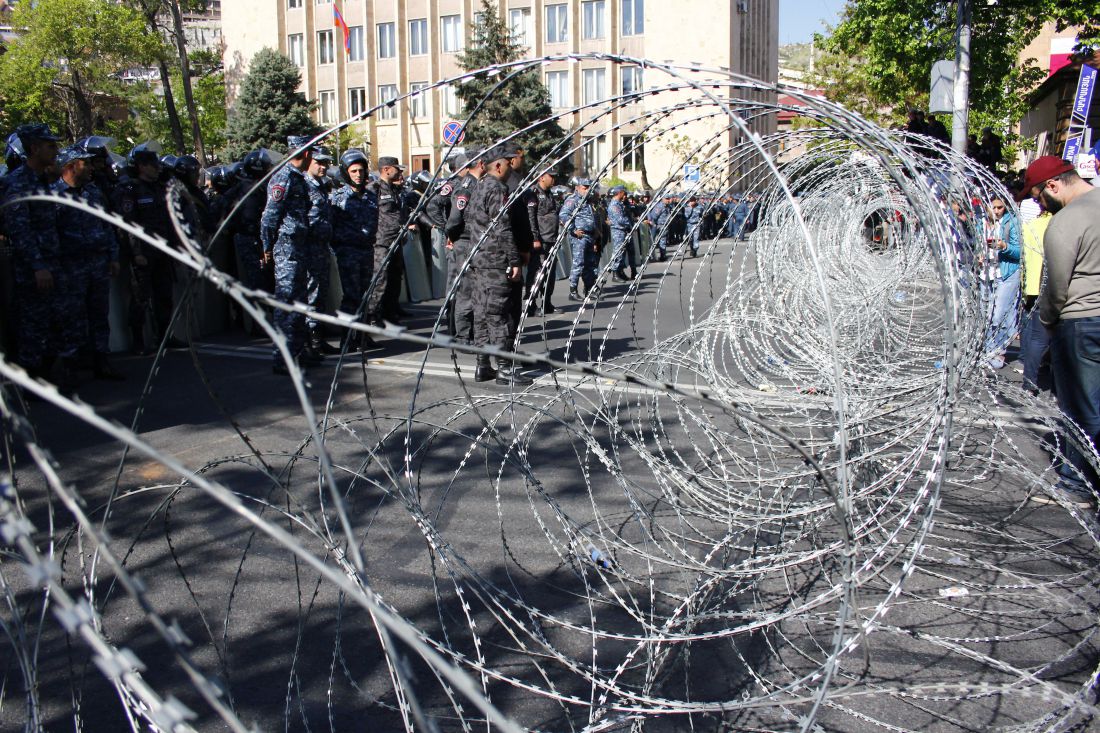In just the years 2015-2018, a few dozen cases of violence against journalists have been recorded during the coverage of political and civil upheaval and actions of disobedience in Armenia.
Journalists were beaten, their tools damaged, and they had received treatment in medical institutions for days.
There is still no culture of insuring the property, life and health of a journalist in Armenia.
The importance of insurance is well understood by the CivilNet editorial office. During the riots in Gyumri in the wake of the massacres committed by Valery Permyakov in 2015, CivilNet journalists were caught in the middle of demonstrators and law enforcement officers and were injured. During the April revolution, a police officer had beaten a CivilNet journalist. These are only a small fraction of what had happened.
Editor in Chief of CivilNet, Karen Harutyunyan draws attention to the fact that in Armenia, there is no life insurance so far, but more than 100 years ago our ancestors insured their lives in the Ottoman Empire. The inheritance of that insurance is still being received by their heirs.
“We are a country at war and we do not know what will happen in the future. Our journalists have experience in the front line. It is unclear, as to what can happen to these people, if military operations begin again. All journalists would like to have social guarantees, be insured from accidents and possible violence against them,” says Karen Harutyunyan.
In answering the question as to who should provide that insurance, and if the state should create the conditions for this, taking into account the importance of journalists in public life, the Editor in Chief of CivilNet replied, “I think that now, the government is facing more urgent issues than journalists’ insurance. But this issue should be raised one day. If we simply talk about insurance, firstly, we must state that the fundamental rights of journalists are violated in editorial offices. The problem of overtime work of journalists or issues regarding night shifts are not solved.”
According to Boris Navasardyan, the president of the Yerevan Press Club, in any case, if the insurance is for professional activity, it must be provided by the employer.
“I don’t think that the state should do this, because this is a private sector. No matter how much our constitution stipulates that journalists are engaged in special activities, I think that this formulation is a bit artificial.
Although, I understand that the economic situation of the media is rather complicated, and if we put these expenses on their shoulders, they simply cannot survive. I think that insurance must be accompanied by signing a labor contract, at the same time.”
Navasardyan suggests that in case of severe conditions, the employer can insure only journalists whose work is risky, who cover rallies where force can be used. But not column or analysis writers. The contract of insurance must specify that the expense coverage is performed exclusively for the purpose of injuries acquired while performing professional duties.
No Armenian insurance company offers insurance and life insurance coverage for journalists. Ingo-Armenia insurance company representative Harutyun Gevorgyan says that there is no such package because the demand has not been formed.
“A separate product for journalists will be created when there is a mass demand. For example, if a union representing journalists, a trade union hold official negotiations with insurance companies. If we are talking about 2-3 cases, it is either done at a very high price or not at all. Insurance is carried out in cases where the law of large numbers work, there are statistics, there is regularity,” says Harutyun Gevorgyan.
He says that those professionals working in hotspots or, centers of political excitations, require insurance which has a higher coverage than standard, because, as a rule, in any insurance contract acts of civil disobedience, destructions, disasters, earthquakes, wars, etc., are normally exceptions of the standard package.
There is no life insurance in Armenia, since within the model of the EU Member States, insurance companies have the right to only implement life insurance or non-life insurance. All non-profit companies operating in Armenia carry out non-life insurance.
The issue of journalists’ insurance in Armenia has been discussed years ago, placing importance mainly on the issue of insuring journalists working in the war zone.
President of the Yerevan Press Club, Boris Navasardyan says that there was a conversation, according to which the International Alliance of Journalists, a union of national journalistic trade unions would have to deal with that issue.
There is also a Journalistic Security Institute, which until now, insures the lives of journalists working in hot spots.
Journalists are nominated by the media or trade unions. It is necessary to substantiate why the institute should implement their life and health insurance.
For more information on the international practice of insurance for journalists, read here.
Gagik Aghbalyan







